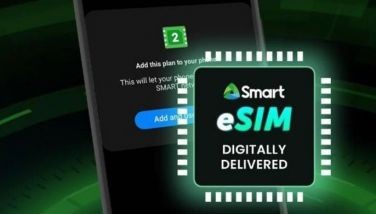US wireless firms battle it out in music downloads
February 18, 2006 | 12:00am
The competition between wireless providers is beginning to look like a battle of the bands. Song-playing phones are proliferating, and the companies are looking for an edge with cheaper downloads and different ways of delivering tunes to cellphone users.
US wireless carriers Verizon Wireless and Sprint are betting that young consumers will shell out as much as $2.50 a pop to download songs to their cellphones from thin air. Cingular Wireless is hoping its redesigned iTunes-compatible phone, the Motorola Slvr L7, won’t tank the way its predecessor did.
The three companies all hope to end up with profitable music businesses to augment their shrinking voice revenues.
Last year, US wireless carriers generated an average of $58 in revenue per month from each subscriber, up from $56.10 in 2000, according to Strategy Analytics, a Boston research firm.
Data services such as e-mail and ringtone downloads fueled the growth, while the cellphone companies have actually been giving away more free minutes for lower prices, said David Kerr, vice president of Strategy Analytics’ wireless practice.
"The US is one of the high-growth markets for ringtones and music," he said.
Sprint and Verizon appear headed toward a pricing duel on music downloads. Verizon’s V Cast Music service debuted in January with song downloads at $1.99 each. That’s about 20 percent less than the $2.50 per song the Sprint Music Store has charged since it premiered last October.
Though they carry different price tags, the two services are nearly identical. Both require a handset compatible with their high-speed networks and a removable memory card to store the music you buy.
Sprint’s service has three compatible phones – the Sanyo MM-9000, and the Samsung MM a940, both at $300, and the Samsung A900 for $350. LG Electronics’ $200 VX 8100 and Samsung’s $150 a950 are compatible with V Cast Music.
One of the most impressive things about the LG and Sanyo phones is their speakers. Tiny as they are, they reproduce music with good, though not stellar, clarity. Most users won’t want to disturb the general public with their music, so a pair of headphones with a 1/2florin 3/4-inch plug is recommended.
With both services, you can use your phone’s keypad to search for music by title, artist, album, or genre, or pick from new tracks or artists featured by either service.
Both services offer a 30-second preview before you buy. If you like what you hear, getting a song onto your phone takes a few presses of the keypad and about a 45-second wait.
There are differences other than the cost, though.
V Cast uses an interface that looks like a Web browser on your computer, letting you toggle to Mary J. Blige’s picture at the top of your phone’s screen or click onto any number of search buttons to find what you’re looking for.
Sprint’s service is less visually appealing, but its simple white background with a text menu of choices like "Featured Music" or "Categories" might explain why the Sprint Music Store cranks right up, while the Verizon service takes a few seconds longer to load.
Verizon and Sprint did their homework on what CD burning and listening restrictions consumers will tolerate. Both services offer two downloads for the price of one: one for use on your phone and another to be saved onto a PC for burning or loading onto another media player.
Songs bought on a Sprint phone are downloaded to a computer from Sprint’s website, which keeps track of what you’ve purchased and what’s already been downloaded. There is no way to buy music from Sprint on your computer.
But thanks to a partnership with Microsoft Corp., Verizon Wireless is selling songs online, too. This works by upgrading the computer’s copy of Window’s Media Player with Verizon’s V Cast Music software, which is included when one buys one of its V Cast phones.
Users can then download copies of songs bought from their phones onto their computers or they can browse and buy other tracks directly for 99 cents.
That may seem like a bargain compared to what Verizon charges for wireless downloads, but of course there’s a catch. A song bought online is delivered as a larger file than one formatted for your phone, meaning you’d fit fewer songs on your phone’s memory card if you did all your downloading that way.
While Verizon and Sprint are battling over mobile downloads, Cingular’s new Slvr phone, like its short-lived predecessor the Rokr, does not allow wireless downloads.
Instead, the Slvr is pretty much the same phone in a cooler skin than the uninspiring Rokr, which Cingular had the misfortune of introducing from the same podium as Apple Computer Corp’s more celebrated iPod Nano.
The Rokr was billed as the first music phone in the United States, with a stripped-down version of iTunes built-in but limited to storing 100 songs, while the Nano holds 10 times as many tunes.
The Slvr, pronounced "sliver," and designed to look like Motorola’s successful Razr phones, has the same limit.
Why?
Because, said spokeswoman Jennifer Bowcock, Cingular still thinks there’s a market for the phone among people who want to take their music with them without carrying a separate phone and iPod, and who don’t really think mobile downloading is all that important. — The Boston Globe
US wireless carriers Verizon Wireless and Sprint are betting that young consumers will shell out as much as $2.50 a pop to download songs to their cellphones from thin air. Cingular Wireless is hoping its redesigned iTunes-compatible phone, the Motorola Slvr L7, won’t tank the way its predecessor did.
The three companies all hope to end up with profitable music businesses to augment their shrinking voice revenues.
Last year, US wireless carriers generated an average of $58 in revenue per month from each subscriber, up from $56.10 in 2000, according to Strategy Analytics, a Boston research firm.
Data services such as e-mail and ringtone downloads fueled the growth, while the cellphone companies have actually been giving away more free minutes for lower prices, said David Kerr, vice president of Strategy Analytics’ wireless practice.
"The US is one of the high-growth markets for ringtones and music," he said.
Sprint and Verizon appear headed toward a pricing duel on music downloads. Verizon’s V Cast Music service debuted in January with song downloads at $1.99 each. That’s about 20 percent less than the $2.50 per song the Sprint Music Store has charged since it premiered last October.
Though they carry different price tags, the two services are nearly identical. Both require a handset compatible with their high-speed networks and a removable memory card to store the music you buy.
Sprint’s service has three compatible phones – the Sanyo MM-9000, and the Samsung MM a940, both at $300, and the Samsung A900 for $350. LG Electronics’ $200 VX 8100 and Samsung’s $150 a950 are compatible with V Cast Music.
One of the most impressive things about the LG and Sanyo phones is their speakers. Tiny as they are, they reproduce music with good, though not stellar, clarity. Most users won’t want to disturb the general public with their music, so a pair of headphones with a 1/2florin 3/4-inch plug is recommended.
With both services, you can use your phone’s keypad to search for music by title, artist, album, or genre, or pick from new tracks or artists featured by either service.
Both services offer a 30-second preview before you buy. If you like what you hear, getting a song onto your phone takes a few presses of the keypad and about a 45-second wait.
There are differences other than the cost, though.
V Cast uses an interface that looks like a Web browser on your computer, letting you toggle to Mary J. Blige’s picture at the top of your phone’s screen or click onto any number of search buttons to find what you’re looking for.
Sprint’s service is less visually appealing, but its simple white background with a text menu of choices like "Featured Music" or "Categories" might explain why the Sprint Music Store cranks right up, while the Verizon service takes a few seconds longer to load.
Verizon and Sprint did their homework on what CD burning and listening restrictions consumers will tolerate. Both services offer two downloads for the price of one: one for use on your phone and another to be saved onto a PC for burning or loading onto another media player.
Songs bought on a Sprint phone are downloaded to a computer from Sprint’s website, which keeps track of what you’ve purchased and what’s already been downloaded. There is no way to buy music from Sprint on your computer.
But thanks to a partnership with Microsoft Corp., Verizon Wireless is selling songs online, too. This works by upgrading the computer’s copy of Window’s Media Player with Verizon’s V Cast Music software, which is included when one buys one of its V Cast phones.
Users can then download copies of songs bought from their phones onto their computers or they can browse and buy other tracks directly for 99 cents.
That may seem like a bargain compared to what Verizon charges for wireless downloads, but of course there’s a catch. A song bought online is delivered as a larger file than one formatted for your phone, meaning you’d fit fewer songs on your phone’s memory card if you did all your downloading that way.
While Verizon and Sprint are battling over mobile downloads, Cingular’s new Slvr phone, like its short-lived predecessor the Rokr, does not allow wireless downloads.
Instead, the Slvr is pretty much the same phone in a cooler skin than the uninspiring Rokr, which Cingular had the misfortune of introducing from the same podium as Apple Computer Corp’s more celebrated iPod Nano.
The Rokr was billed as the first music phone in the United States, with a stripped-down version of iTunes built-in but limited to storing 100 songs, while the Nano holds 10 times as many tunes.
The Slvr, pronounced "sliver," and designed to look like Motorola’s successful Razr phones, has the same limit.
Why?
Because, said spokeswoman Jennifer Bowcock, Cingular still thinks there’s a market for the phone among people who want to take their music with them without carrying a separate phone and iPod, and who don’t really think mobile downloading is all that important. — The Boston Globe
BrandSpace Articles
<
>
- Latest
Latest
Latest
February 22, 2024 - 3:17pm
February 22, 2024 - 3:17pm
December 28, 2023 - 12:00am
December 28, 2023 - 12:00am
December 11, 2023 - 11:00am
December 11, 2023 - 11:00am
November 23, 2023 - 4:35pm
November 23, 2023 - 4:35pm
Recommended




























